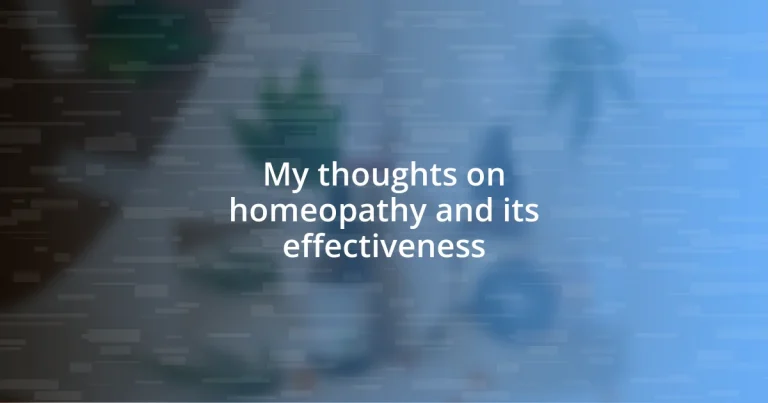Key takeaways:
- Homeopathy operates on the principle of “like cures like,” emphasizing individualized treatment and the process of potentization through dilution and succussion.
- Founded by Samuel Hahnemann in the late 18th century, homeopathy gained popularity as an alternative to conventional medicine but faced ongoing skepticism and critiques from traditional healthcare practices.
- Personal experiences with homeopathic remedies highlight mixed effectiveness, influenced by individual beliefs and the potential placebo effect, raising important questions about the evaluation of healthcare treatments.

Understanding homeopathy basics
Homeopathy is based on the principle of “like cures like,” which means that a substance that causes symptoms in a healthy person can, in a diluted form, treat those same symptoms in someone who is ill. I remember a time when I had a stubborn cold, and a friend suggested a homeopathic remedy made from onion—believe it or not! It was fascinating to see how something so simple could offer relief by mirroring the symptoms.
Another essential concept is potency, which refers to the degree of dilution of the remedy. I often think about this when considering how something can be so diluted yet still have an effect. Isn’t it intriguing how homeopathic practitioners often emphasize that less is more? The idea that the process of succussion—vigorous shaking of the solution—plays a role in enhancing its efficacy adds another layer of curiosity to the method.
Furthermore, homeopathy takes into account the individual as a whole, not just the symptoms they present. This holistic approach resonates deeply with me; it makes you feel heard and understood rather than just treated like a number. Isn’t it refreshing to think that healing could be about the unique experience of each person?

Historical background of homeopathy
Homeopathy traces its roots back to the late 18th century, founded by Samuel Hahnemann, a German physician who sought alternatives to the conventional medical practices of his time. Frustrated by the ineffective treatments of his day, such as bloodletting, he began experimenting with the idea that highly diluted substances could trigger healing. I often find myself reflecting on Hahnemann’s groundbreaking ideas; they were revolutionary then, challenging the very foundations of medicine.
Here are some key historical points about homeopathy:
- 1796: Hahnemann published his first essay on homeopathy, introducing the principle of “like cures like.”
- 1810: He released the first edition of “Organon of the Medical Art,” outlining the philosophy and methodology of homeopathy.
- 1835: The first homeopathic medical school was established in North America, indicating a growing interest in this approach.
- 1850s-1860s: Homeopathy gained popularity, especially in the United States and Europe, partly due to the failures of traditional medicine during epidemics.
- 1880s: Homeopathy faced critiques and challenges from conventional medicine, beginning a historical rivalry that continues to this day.
Learning about this background reminds me of how established practices can sometimes stifle innovation, a sentiment I believe many share when grappling with change in any field. The evolution of homeopathy illustrates a journey from skepticism to acceptance, and it always sparks my curiosity about how we define and validate wellness.

Principles behind homeopathic treatments
The principles behind homeopathic treatments are centered around a few key concepts that create an intriguing framework for healing. One of the most striking ideas, which truly resonates with my own experiences, is the concept of “potentization.” This process involves diluting a substance and then shaking it rigorously, known as succussion. I find it both puzzling and fascinating how something can be diluted to the point where no molecules of the original substance remain, yet many still believe it has a powerful impact. It challenges my understanding of medicine and compels me to consider what it means for something to be “effective.”
Another fundamental principle is the individualized approach that homeopathy promotes. Rather than simply addressing the illness, it looks at the complete person—mental, emotional, and physical states. I remember a friend who visited a homeopath for severe anxiety; the tailor-made remedy she received did wonders for her. It was eye-opening to see how her unique emotional landscape was factored into her treatment, making her feel like an active participant in her healing journey.
Lastly, the foundational idea of “like cures like” plays a pivotal role in homeopathy. This principle can seem counterintuitive at first, but it raises some interesting questions about how we perceive health and disease. When I first learned about this concept, I was skeptical. However, many patients report success with remedies that provoke similar symptoms in a healthy person. This prompts me to consider how deeply our bodies are interconnected, further emphasizing the art and science behind homeopathic medicine.
| Principle | Description |
|---|---|
| Potentization | The process of diluting and shaking a substance to enhance its healing properties. |
| Individualized Treatment | Focuses on treating the whole person rather than just the illness. |
| Like Cures Like | The philosophy that substances causing symptoms in healthy individuals can treat similar symptoms in the ill. |

Evaluating homeopathy’s effectiveness
Evaluating homeopathy’s effectiveness can be a bit of a double-edged sword. On one hand, I see countless testimonials from people claiming significant improvements in their health after using homeopathic remedies—anecdotes that certainly caught my attention. Yet, I often wonder if these results stem more from the power of belief and the placebo effect rather than the remedies themselves. Have you ever had a treatment that just seemed to work because you believed it would?
As I dive deeper into the research, I can’t ignore the mixed outcomes reported in various studies. Some meta-analyses suggest that homeopathy may not be more effective than a placebo in rigorous clinical settings. This raises important questions about what we deem effective in healthcare. Is it about clinical trials alone, or should patient experiences and individual stories hold weight in our evaluations? I’ve seen friends feel markedly better after a homeopathic treatment, but I also acknowledge that science demands evidence.
Each time I engage in discussions about homeopathy, it’s crucial to remain open-minded. I’ve encountered both staunch advocates and fervent skeptics, and each conversation reveals layers of complexity regarding health perceptions. Reflecting on my own experiences, I’ve realized that effective healthcare may not always fit neatly into one box; sometimes, it intertwines belief, personal journey, and individual responses—a tapestry of healing that can be as intricate as it is meaningful.

Common homeopathic remedies used
When discussing common homeopathic remedies, I can’t help but think of Arnica montana, which is often recommended for bruising and muscle soreness. I remember a time when I twisted my ankle during a hike; a friend suggested I try Arnica. To my surprise, the swelling went down significantly, which made me wonder about the plant’s essence and how it interacted with my healing process. It’s fascinating how something derived from a flower can evoke such responses, isn’t it?
Another widely used remedy is Rhus toxicodendron, commonly referred to as poison ivy. Surprisingly, this remedy is often taken for joint pain and stiffness, particularly after inactivity. I recall a colleague who struggled with back pain after long hours at her desk. She started using Rhus tox, and she was amazed at how it helped her feel more limber. It got me thinking—how can something that causes discomfort in one context serve as a relief in another? This dual nature of substances really adds layers to the understanding of homeopathy.
Then there’s Nux vomica, known for addressing digestive issues and hangovers. It’s intriguing how many people I’ve encountered who swear by it after a night of indulgence. The other day, I chatted with someone who shared how taking Nux vomica made her feel human again after a festive event. It’s moments like these that lead me to continuously reflect on the interplay of remedies and personal experiences. Why do we turn to these natural solutions, and what does that say about our connection to traditional healing methods? Each remedy seems to hold a story, intertwining with our lives in meaningful ways.

Personal experiences with homeopathy
I remember my first encounter with homeopathy during a particularly nasty cold. A friend suggested a homeopathic remedy for my symptoms, and honestly, I was skeptical. But after taking it, I noticed a subtle shift in how I felt—less stuffy and more energized. It made me wonder, was it the remedy or just my body’s natural healing processes kicking in? It was a curious blend of hope and doubt.
Later, I tried a homeopathic remedy for anxiety before a big presentation. It was a nerve-wracking moment for me, and I didn’t know what to expect. To my surprise, I felt surprisingly calm and collected, almost as if a weight had lifted. Reflecting on that experience, I found myself pondering: Could this gentle approach to treating emotions really offer the support I needed during stressful times? It was a reassuring thought and left me yearning to explore more about how these remedies could connect with my mental well-being.
Then there was the time I dealt with seasonal allergies. I was at my wits’ end with constant sneezing and itchy eyes. A family member urged me to try a homeopathic solution, and although I was doubtful, I decided to give it a shot. As I noticed my symptoms easing, I couldn’t help but feel a growing appreciation for the intricacies of homeopathy. What amazed me most was not just the relief, but the conversations it sparked within my family about alternative approaches to health. Have you ever experienced a moment where something unexpected changed your view on healing? It really does make you think about the diverse paths we take for health and relief.

Conclusion on homeopathy effectiveness
When reflecting on homeopathy’s effectiveness, I find it hard to ignore the mixed opinions surrounding it. I once attended a wellness seminar where the speaker passionately discussed homeopathic principles, contrasting them with conventional medicine. It made me wonder—can the power of belief and intention really influence our healing journey? My experience suggests that while homeopathy may not work for everyone, its efficacy seems to hinge on individual perspectives and experiences.
I vividly recall a conversation with an old friend who swore by homeopathy during her pregnancies. She recounted how remedies helped alleviate her morning sickness and heightened sense of smell. Listening to her joy and relief made me think—could these gentle remedies truly provide comfort during such transformative times? This sentiment led me to appreciate homeopathy’s potential value beyond just addressing physical ailments; it plays a role in emotional well-being and the holistic experience of health.
Ultimately, whether these remedies work can often depend on the person using them. I think back to moments when I felt a sense of calm wash over me after taking a homeopathic remedy, despite the scientific ambiguity surrounding it. Have I had a placebo effect? Perhaps. Yet, those instances foster my curiosity about our connection to nature’s offerings. Isn’t it fascinating how our individual stories with homeopathy weave into a broader narrative about health choices? It’s this blend of anecdotal evidence and personal exploration that makes the conversation about homeopathy not only relevant but genuinely engaging.














